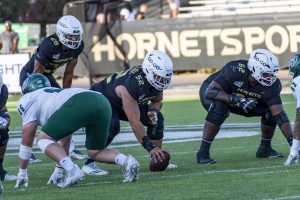Sac State professor explains his use of word ‘genocide’
October 22, 2015
The following is an op-ed demonstrating the views of the author in light of the events following an alleged disenrollment from a history class at Sac State. The State Hornet sides with neither the student nor the professor.
Since the unfortunate incident in my class (HIST 17A: United States history, 1607-1877) over a month ago, much has been said and written about me. Little of it is true. I have spent the majority of my life and my entire professional career combatting the falsehoods and misconceptions of which I have been unfairly accused. It is especially difficult to correct the inaccuracies reported by the press and relayed through social media. Let me take a moment to tell you about myself, my beliefs and values, and my professional objectives.
History has always fascinated me. Since childhood I knew I wanted to devote my life to the historical profession. Like many of you I am a passionate lifelong learner, someone who is enthusiastic about advancing my discipline. I firmly believe that only by studying and learning from the past can we eradicate present-day inequalities and injustices. With this goal in mind, I teach an American history that acknowledges our nation’s diversity, one that is bathed in blood and violence as much as glory and honor, to depict an inclusive and multicultural present and future. I do this because I am fiercely dedicated to social justice and equality.
Here is the exact quotation that initiated this situation:
“Native peoples created small-scale hunting and gathering societies, large-scale fishing societies, grand agricultural civilizations. Native peoples tended to speak numerous kinds of languages and created in that a diversity of cultures. Not only were [sic] there a diversity of cultures, but there were a large number of people on this continent when Europeans arrived. I don’t like to use the term ‘genocide’ because ‘genocide’ is something that is done on purpose, but needless to say European diseases primarily, European diseases primarily, will wipe out Native American populations in the two continents and hence one of the reasons why later in history many Europeans will imagine that these continents were empty. But we know that as many as twenty-five million people might have lived in what we call Central America today. Another seven to ten million people lived in what we call North America today.”
My understanding of genocide has been gleaned through years of experience, study, and analysis. I was raised in a Jewish household in the shadow of the Holocaust and understand firsthand the social and cultural weight of that term. My studies included the oftentimes emotional investigation and analysis of atrocities committed against Jews and people of other religious, racial, and cultural identities, including Native Americans.
My understanding of the complex nature of these topics developed as my familiarity with the methods of historical inquiry evolved. I have since taught or helped teach courses at several campuses specifically in Native American history and the history of the Holocaust that further informed my views and understanding of genocide and related issues.
My course—and any United States history survey course at Sac State—recognizes the dynamic and historically contingent nature of our nation’s past. I always seek to present a thoughtful, challenging, and sophisticated reflection, one that encompasses the historical agency of multiple participants in often (though not invariably) antagonistic situations.
None of my lectures, reading materials or other assignments ever deny the atrocities, violence, murder, enslavement or deceit committed against native peoples or anyone else in American history. This is our history. This is what I have dedicated my life to studying and teaching.
This recent event has been both an upsetting and humbling experience yet one that can serve as a learning tool for me and for Sac State students. I am committed to collegiality and mutual respect between all students, professors, and colleagues. My classroom is and will always be a safe environment for historical dialogue and discussion. Thank you for your time and consideration.
























































































































